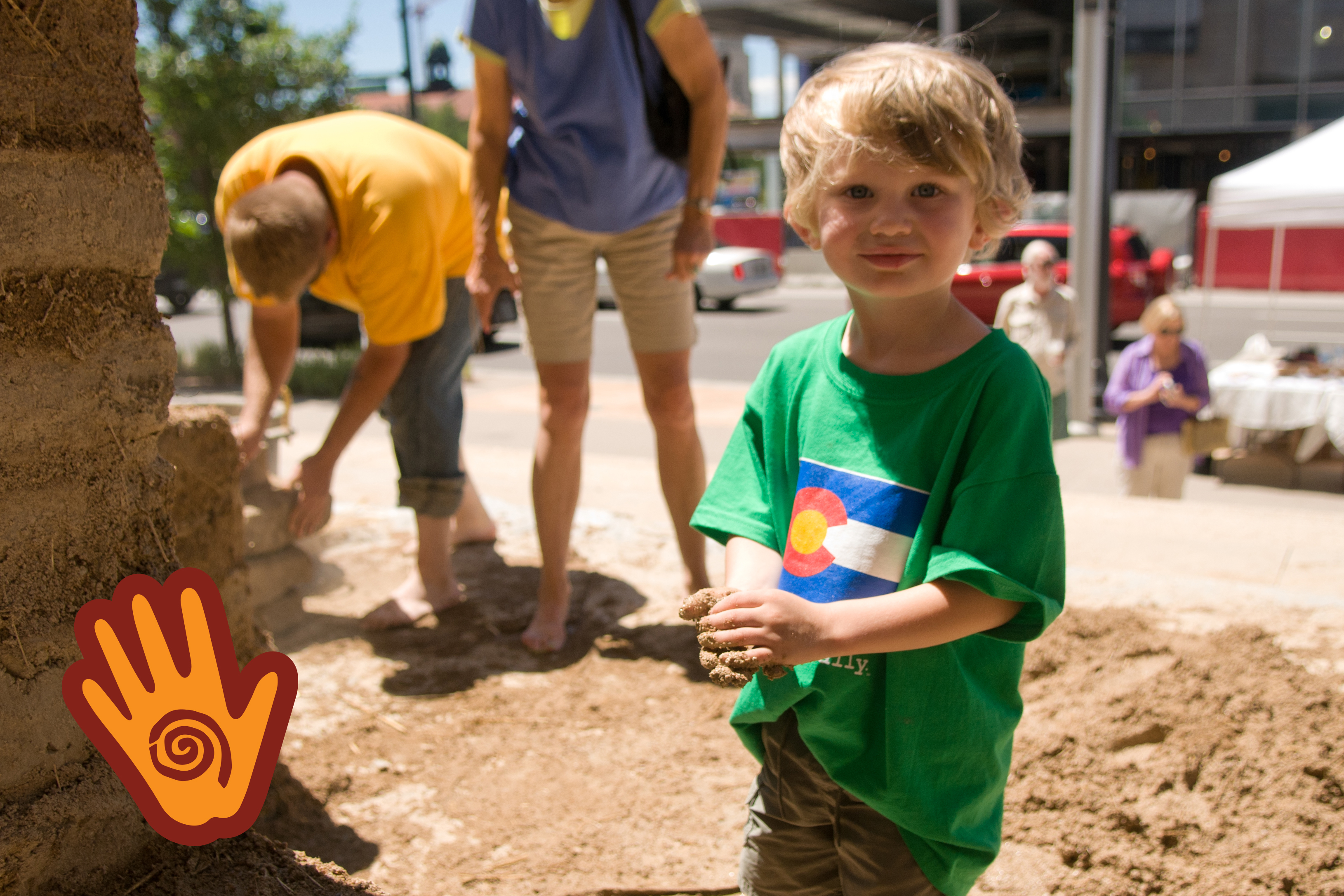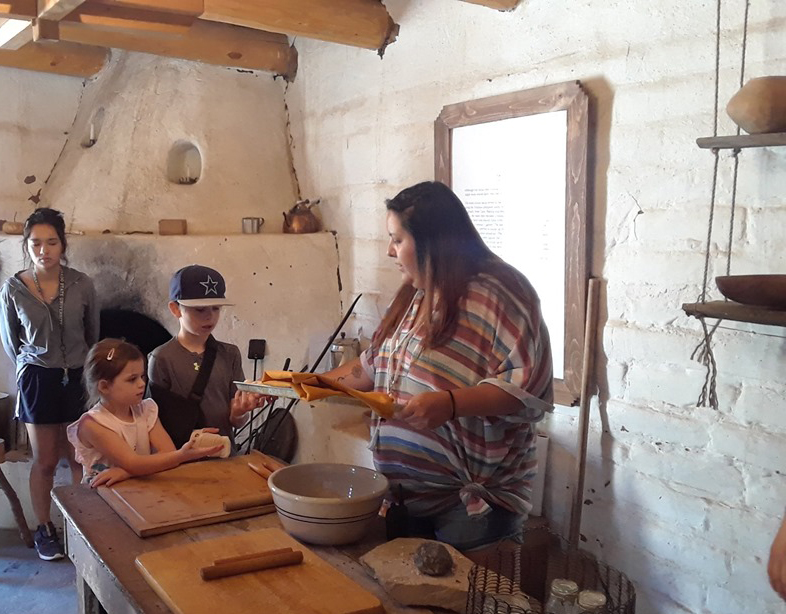Story
Five Opportunities for Heritage Education in Colorado
Colorado has a rich and varied heritage. For centuries it was a place on the frontier, a living borderlands where many different cultures, countries, and nationalities intersected and interacted, often working together to live prosperously. Settlers from a wide variety of regions traveled here and shared the common experience of living on the frontier of their homelands. Because of this, there are many traditional skills, habits, and knowledge that all Coloradans have in common as a shared history.
Most of these skills and crafts are still practiced, though not as widely or frequently. Fiber crafts are a prime example. Colorado still has a great number of shepherds and ranchers who produce the wool, which is then worked, dyed, weaved, knitted, stitched, and sewn into a large variety of still-useful crafts. Every time someone takes up a weaving rod or a knitting needle, they are participating in part of that shared heritage. These are skills that our ancestors and precursors used every day to survive and thrive in the borderlands, and they are still going strong today.
There are many other heritage skills still alive in Colorado. From tortilla making to chile roasting, from horno construction to adobe brick laying, from canning and food preservation to creating hand-made soaps and dyes. Each of these crafts is the continuation of something that was vital to Colorado history and in the daily lives of this state’s earliest inhabitants.
Learning about and practicing these skills is an enriching experience, both for people who have never tried them before and for those who have been practicing them their whole lives. It is a way to connect with a common heritage and learn something new and exciting at the same time.
For this reason, most of History Colorado’s museums have regular classes and programs where visitors can learn and practice these heritage skills. Here’s a list of five of the great opportunities from History Colorado to learn heritage skills this year:
1. Living History Weekends at Fort Vasquez
Every weekend, Fort Vasquez hosts a living history event in which museum volunteers and associates wear period costumes and reenact different skills that would have been vital to daily life at the historic fort in the 1800s. These skills range from pickling to tanning hides to bush-craft to even just cooking over an open fire.
What makes these workshops special is the Living History aspect. The goal of these events is to provide a snapshot of life during the frontier days of Colorado, and to demonstrate to visitors the important skills of that era by allowing them to not only watch it being done live by experienced professionals, but also to try their hand at it themselves. The workshops are always interactive as well as educational, and allow for hands-on fun for everyone involved.
Importantly, each of the skills taught in the Living History workshops are not only true to the time period and important to the cultural history of Colorado, they are also still usable and relevant today.
“Workshops like ‘Bush-craft of the Past’ are survival skills of the native people and frontiersmen alike,” said Bill Armstrong, the director of Fort Vasquez Museum. “And this format shows how to apply those concepts and skills in a modern scope. These workshops teach about shelter, water, cordage, tool-making, and more. Many of these skills are practical for outdoor enthusiasts, and in a survival situation could potentially save your life. Making fire without matches, for example, is an important skill that anyone can apply.”
Upcoming workshops will be teaching a variety of skills, including sewing and stitching moccasins, bushcraft, and a new series of Frontier Foods workshops. These food workshops will include pickling vegetables, baking in an earth oven, smoking meats, and more.
The Living History Weekend workshops demonstrate that technology and skills of the past are still relevant today, and can be utilized by everyone to enrich their lives- or just cook a delicious meal.
For more information, you can visit the Fort Vasquez Facebook page here.
2. New Skills Saturday at Fort Garland
Fort Garland Museum and Cultural Center hosts a variety of interactive and educational events, but one of the most special is the New Skills Saturday series of workshops. Throughout the summer, visitors to the museum can attend these workshops in order to learn about and practice important heritage skills that would have been key parts of daily life among the soldiers stationed at the fort and their families who lived and worked with them.
New Skills Saturdays run every year starting and May and continuing through August. These workshops are not held every Saturday, as each one is hosted by a different expert or artisan. They come to Fort Garland from across the state and even from New Mexico to teach these skills.
Because of the varying schedule, sometimes there are multiple workshops occurring at the same time. Coming up in early July, there will be three workshops happening on the weekend of July 5th-6th. On that Saturday, two different sessions will be happening at the same time- the first being an Open-Air Drawing class, and the second being a demonstration on traditional Navajo weaving. That Sunday, the Open-Air Drawing class will repeat, while a blending board class will also be held.
For more information about when the next workshop will be held, and what the subject will be, make sure you follow the Fort Garland Facebook page.
3. New Skills Saturday at Ute Indian Museum
Ute Indian Museum in Montrose, Colorado also hosts a variety of educational events, including New Skills Saturday workshops similar to those held in Fort Garland. These workshops focus on the skills that were used by the Ute Nation, the original inhabitants of the area. These skills include musical performance (such as the flute) and the all-important adobe making.
Ute Indian Museum’s New Skill Saturdays are held year-round, but on an irregular basis. Just as with Fort Garland, each workshop is hosted by a different expert or artisan. They come to Montrose and the Ute Indian Museum from all around Colorado to share their skills and to help with these interactive workshops.
For more information about when the next workshop will be held, make sure you follow the Ute Indian Museum on Facebook.
4. Third Thursdays at Trinidad History Museum
Every third Thursday at Trinidad History Museum a heritage night is held. These events include treats, sweets, and hands-on workshops focusing on one of a variety of heritage skills that may have been practiced by the original inhabitants of the museum’s historic buildings, such as the Bloom Mansion or the Baca House.
The skills taught at these workshops vary quite a bit, ranging from how to make adobe to the construction of traditional native dreamcatchers. Each event is a celebration of Colorado heritage, including both the pioneers and settlers to the Colorado territory as well as the natives and original inhabitants of the region.
Third Thursdays are not held during the summer, but will resume in September 2019. For more information about these heritage celebrations, make sure you follow the Trinidad History Museum on Facebook.
5. The Trading Post at El Pueblo History Museum
At El Pueblo History Museum is an adobe re-creation of the original El Pueblo trading post. This trading post is educational in and of itself- it has a lot to teach visitors about life in the earliest days of the Colorado Territory, from architecture to daily chores to cooking and cleaning.
During the Summer, between Memorial Day and Labor Day, the trading post is opened for visitors and hosts a variety of educational experiences led by museum staff. There is a different skill being taught there every day of the week:
- Sunday- Adobe brick making
- Monday- Corn husk doll making
- Tuesday- Tortilla making and baking
- Wednesday- Wool studio
- Thursday- Adobe brick making
- Friday- Frontier skills
- Saturday- Staff Choice! (something different every week)
All of these skills are hands-on and interactive. Visitors have the opportunity to participate in the activity and learn by doing, which is one of the most important aspects of these lessons. Just like with the Living History Weekends at Fort Vasquez, one of the purpose of these lessons is to give a small peek into what life was like during the frontier days of Colorado, and to allow visitors to connect with history by practicing the same skills that their ancestors and forerunners did for centuries.
The El Pueblo trading post is open every day from 10 am to 2 pm, and entry is free with a museum ticket. For more information, you can visit the museum’s Facebook page here.



